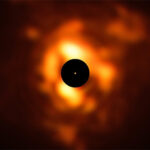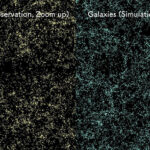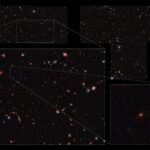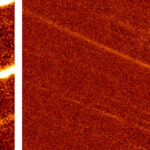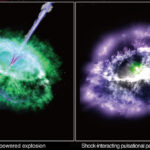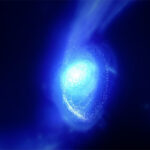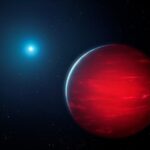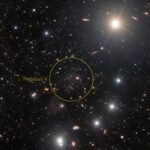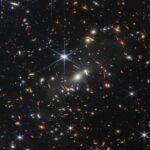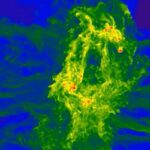One of the brightest stars in the sky is evolving and dying before our eyes
Versão portuguesa disponível aqui Nothing lasts forever, including the stars in our night sky. One of the brighter and more notable stars in our sky is Betelgeuse, the bright red supergiant in the shoulder of Orion. Infrared light emitted by dust around Betelgeuse in December 2019. Credit: ESO/P. Kervella/M. Montargès…
Artificial intelligence helps astronomers see farther and sharper
To understand the evolution of the Universe, astronomers use many complex equations. Because there are some things that we do not know for sure yet, scientists have to estimate some of the values in these equations – such values come from different simulations, and the best ones match real-life observations…
Wide View of Early Universe Hints at Galaxy Among the Earliest Ever Detected
Versão portuguesa disponível aqui Two new images from NASA’s James Webb Space Telescope show what may be among the earliest galaxies ever observed. Both images include objects from more than 13 billion years ago, and one offers a much wider field of view than Webb’s First Deep Field image, which…
A Comet Breaking-Up
For the first time, astronomers captured images of a strange rocky comet, breaking apart as it went closer to the Sun. Meet 323P/SOHO – a comet that orbits the Sun nearly every years, just like the Earth goes around the Sun every year. Astronomers have discovered just a few like…
A cosmic fairy tale and a discovery
Have you ever heard of the beautiful story of Tanabata? It is much loved and celebrated in Asian cultures such as the Japanese – and has a lot to do with a recent discovery. Tanabata is the story of two lovers, Orihime and Kengyu, who can only meet at the seventh…
An ancient merry-go-round
Astronomers have found that very old galaxies can twirl, too. There are signs of rotation in a galaxy which existed just 500 million years after the Big Bang. This is the earliest galaxy with possible rotation! This ancient galaxy rotates more slowly than modern galaxies – maybe it is on…
Citizen scientist makes an ultra-cool discovery
Using data from the NOIRLab's Community Science and Data Center, ace citizen scientist Frank Kiwy discovered 34 ultracool dwarf binary systems in the Sun’s neighbourhood. This means that we now know twice as many of these systems than before! Illustration of an ultracool dwarf with a companion white dwarf. Credits:…
A fossil galaxy in the outskirts of Andromeda
An international team of astronomers found a dwarf galaxy in the outskirts of the Andromeda Galaxy – located over million light-years from us. The ultra-faint dwarf galaxy, Pegasus V, was spotted by a very attentive amateur astronomer looking at data in an image from the DESI Legacy Imaging Surveys. He…
How the James Webb Space Telescope lets us see the first galaxies in the universe
Versão portuguesa disponível aqui It has been an exciting week with the release of breathtaking photos of our universe by the James Webb Space Telescope (JWST). Images such as the one below give us a chance to see faint distant galaxies as they were more than 13 billion years ago.…
Scientists discover how first quasars in universe formed
Versão portuguesa disponível aqui The mystery of how the first quasars in the universe formed - something that has baffled scientists for nearly 20 years - has now been solved by a team of astrophysicists whose findings are published in Nature. The existence of over 200 quasars powered by supermassive…

